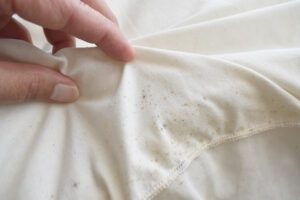As summer approaches, New Englanders begin packing up for weekend getaways, heading to beach houses, lakeside cottages, and family vacation spots. But whether you’re traveling or hosting guests at your own home, one uninvited guest can quickly ruin the experience—bed bugs.
Bed bugs don’t take a summer break. These elusive pests are active year-round, thriving in places with high human traffic like hotels, rental homes, public transportation, and even guest bedrooms. At Cornerstone Pest Control, we want to help you stay vigilant during the busy travel season so you can enjoy a bed bug-free summer.
Why Bed Bugs Are a Concern in Warmer Months
Bed bugs aren’t outdoor pests—they rely on people to spread from place to place, making summer travel a prime time for hitchhiking infestations. As more families head to cottages, beach homes, and rental properties, the risk of accidentally bringing bed bugs home increases. These pests are experts at hiding in luggage, furniture, and linens—and once they’re inside, they’re hard to get rid of without professional help.
Travel Tips to Avoid Bringing Bed Bugs Home

Whether you’re spending a weekend at the coast or flying out of town for vacation, here are some important steps to prevent bed bug exposure:
- Inspect Vacation Rentals and Hotel Rooms
Before unpacking:
- Pull back sheets and check the seams of mattresses and box springs for small bugs, dark spots, or shed skins.
- Examine headboards, sofas, and luggage racks.
- Use your phone flashlight to look in crevices and corners where bed bugs hide.
- Keep Luggage Elevated
- Use luggage racks instead of placing suitcases on the bed or floor.
- Keep clothing sealed in plastic bags rather than using drawers or closets.
- Don’t let personal items touch upholstered surfaces when possible.
-
 Be Cautious on Public Transit
Be Cautious on Public Transit
Bed bugs can be present on buses, trains, and airport seating. Try to avoid placing bags on upholstered seats and always inspect your seat before sitting.
- Unpack Safely at Home
- Open suitcases in a garage or laundry room—not on your bed.
- Wash and dry all clothing on high heat, even items you didn’t wear.
- Vacuum or steam clean your suitcase before storing it.
Keeping Your Home (and Vacation House) Bed Bug-Free
 Bed bugs don’t just enter through travel—they can be introduced through secondhand furniture, overnight guests, or even shared laundry spaces. Keep your year-round and vacation homes protected with these tips:
Bed bugs don’t just enter through travel—they can be introduced through secondhand furniture, overnight guests, or even shared laundry spaces. Keep your year-round and vacation homes protected with these tips:
- Carefully Inspect Secondhand Furniture
Thrifted or gifted items like bed frames, sofas, or dressers should be thoroughly inspected for any signs of bed bugs before bringing them inside.
- Routinely Check Bedding and Upholstered Furniture
Look for rust-colored stains, tiny white eggs, or live bugs in and around beds, couches, and chairs—especially in homes that are frequently rented or used by guests.
- Declutter Sleeping Areas
Reducing clutter gives bed bugs fewer places to hide and makes it easier to detect a problem early.
- Prep for Guests
Hosting family or friends? Offer clean bedding and encourage them to check their luggage before coming inside—especially if they’ve recently traveled or stayed in hotels.
What to Do If You Find Bed Bugs
 Despite all precautions, bed bugs can still slip through. DIY treatments are rarely effective because these pests are experts at hiding and reproducing quickly. If you suspect bed bugs at your home or rental property, professional pest control is the most reliable solution.
Despite all precautions, bed bugs can still slip through. DIY treatments are rarely effective because these pests are experts at hiding and reproducing quickly. If you suspect bed bugs at your home or rental property, professional pest control is the most reliable solution.
At Cornerstone Pest Control, our team specializes in discreet, effective bed bug treatments for homes across New England. We use proven techniques to identify and eliminate infestations—so you can enjoy peace of mind all season long.
Stay Alert This Summer
Whether you’re traveling or welcoming visitors, it pays to stay aware of bed bug risks. With a few proactive steps, you can protect your home and vacation plans from unwanted surprises.
Worried about bed bugs? Call Cornerstone Pest Control today for a professional inspection and treatment plan. Let us help you stay bed bug-free—no matter where summer takes you. For additional reading, check out all the pest articles on our blog!
